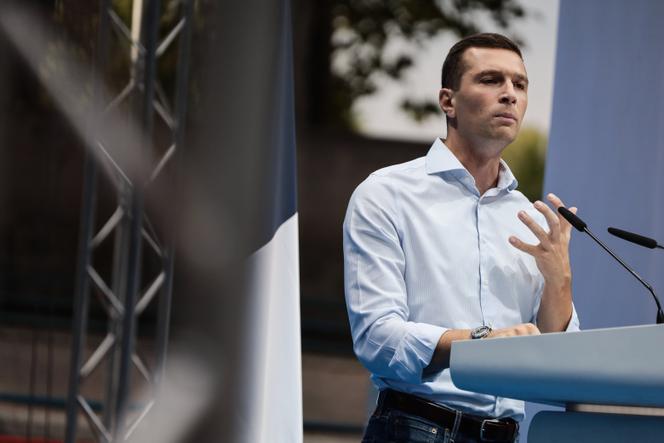


In an overheated Parisian reception room, before an audience of Members of the European Parliament, writers, and entrepreneurs, a young politician praised artificial intelligence (AI), brushed aside "the darkest prophecies," and, condemning over-regulation, spoke of the urgent need for a European public policy in the sector. Jordan Bardella, the president of the far-right party Rassemblement National (RN), has set his sights on artificial intelligence. For the past year, he has emphasized on the importance of "the other 'great replacement'", as he calls it in reference to the racist theory which rejects the mixing of populations. Surprisingly, contrasting with the conservative stance in his camp, the young party leader is championing a tech-friendly position.
On June 19, Bardella wrapped up a symposium organized in Paris by the Identity & Democracy Foundation (ID), associated with the RN-dominated group in the European Parliament. One of his close friends, the entrepreneur Laurent Alexandre, a passionate advocate of transhumanism – which aims to improve man through technology – and artificial intelligence, was there to deliver opening remarks in the provocative, technophile tone that has made him such a successful writer. One of the voices of French tech, Thomas Fauré, the founder of the "sovereign collaborative platform" Whaller, was also present. The rest of the speakers tapped into the European conservative repertoire, which has proved more concerned with the ethical and moral consequences of accelerating AI.
For the RN leader, it is both a genuine interest and a political move which speaks more to the upper class than to blue-collar workers. Bardella acknowledged his passion for Homo Deus: A Brief History of Tomorrow, the best-selling book by Israeli historian Yuval Noah Harari, which predicts two possible developments for humanity: In the first, a man empowered by technology; in the second, a takeover of power by specialized AI algorithms.
"At 27, he belongs to the digital geek generation. In the political class as a whole, few people are as interested in AI and the future as he is," according to Alexandre. Since 2019, the two men have maintained a friendly relationship and regularly have lunch together. The essayist, who supported Macron in 2017 before moving closer to the far right, stressed he was not "politically aligned with the RN" although he advocates "sending illegal immigrants back to Africa by military force".
At an April event organized by the far-right weekly Valeurs Actuelles, Bardella said the "next great social crisis will arise from ChatGPT [a software capable of sustaining an online conversation]," urging schools to adapt to a new era rather than "developing gender studies". His doctrine seems to have been further clarified since. He sees it now as somewhere between "naive technophilia and messianism, on the one hand, and, on the other, neo-Luddism, which would seek to curb or even halt all technological progress." Bardella is convinced society will have to "come to terms with AI, (...) a great factor of progress and comfort for mankind," since, in his view, it could resolve labor shortages in some sectors, such as agriculture or robotics, and cater for stagnating productivity.
You have 49.35% of this article left to read. The rest is for subscribers only.
